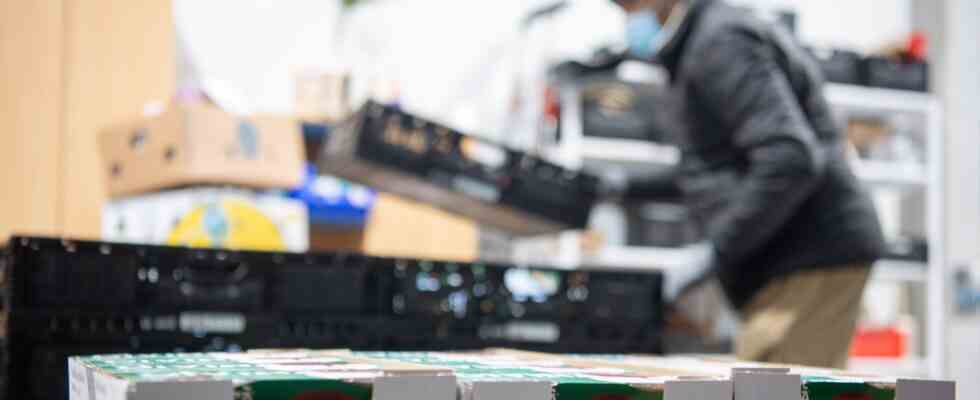Status: 04/18/2022 06:37 a.m
Demand is increasing, donations are falling: the situation at the food banks is getting worse. They call for more donations and demand a rethinking of politics. However, relief is not in sight.
10.30 a.m. in Homburg. The food bank hasn’t started distributing goods yet, but the queue for new registrations is long – most of them are refugees from Ukraine. 100 of them have registered here since the beginning of the war. That’s a lot for a Tafel that supplies a total of 100 households per issue.
Inside, chairwoman Anita Graf-Fischbach just got a call. In any case, the telephone has been her constant companion over the past few months. A grocer has goods to sell. Now things have to be done quickly: talk to the team, send drivers over quickly, because food donations are currently scarce. The retail trade has been calculating more sharply for weeks, there is less of a drop.
“We’ve been on the phone a lot in the past few weeks so that we can fill the shelves,” says Graf-Fischbach. Still, everything is missing.
The customers notice that this morning too. Again and again people ask if there isn’t another potato or onion. Usually the offer is more lavish. Despite the hardship, the atmosphere is always friendly.
Increasing demand since December
Since December, more and more people have been getting their food from the Tafel. In February there was another wave because of the sharp rise in energy prices, and since mid-March there have also been families who fled the war in Ukraine. “All of this comes up against a situation in which there is a shortage of food,” says Sabine Altmeyer-Baumann, chairwoman of the food banks in Rhineland-Palatinate and Saarland.
This exacerbates the current situation compared to the strong refugee movement in 2015. For example, a donation bag campaign with a retail chain had to be postponed because the supermarkets did not have enough goods. The high demand can be explained by the household structure of the new customers. While the Syrian refugees were initially only men, the households of the Ukrainians with women and children are larger. Of course, the shopping list gets longer.
Nationwide emergency
The panels are also struggling with rising operating costs. The cooling of the products is becoming more expensive, as are the travel costs, because the transport routes are becoming longer. Not only the food banks in Saarland are struggling with these problems, but throughout Germany. That is why politicians must act now, demands the federal chairman of the Tafel, Jochen Brühl. Above all, he has short-term help for people with low incomes in mind – such as an increase in the standard rates to 600 euros. “The energy relief with the watering can makes no sense. Why does everyone get the grants? They should be tailored more precisely,” says Brühl.
In addition, the panels continued to struggle with the corona pandemic. “60,000 volunteers do incredible things for us. But many have stopped working because of Corona – simply for fear of infection,” reports Brühl.
Not a basic service, but an additional offer
More and more consumers are suffering from high food prices. According to the Federal Statistical Office, inflation is 7.3 percent. For some items such as sunflower oil, tomatoes and rye flour, prices rose by at least a fifth. This also increases the inquiries at the food banks. They don’t expect an end to the price spiral at the Homburger Tafel.
in the Report from Berlin CDU leader Friedrich Merz said that the peak of prosperity was behind the Germans – at least for a certain time. Large families must now be helped and also the food banks so that they “can do their important work”.
Brühl also sees the state as having a duty: “The state provides, we are only an additional offer.” The authorities in Germany often sent refugees to the Tafel. “We can’t afford that.” Deeds are now needed instead of words. Altmeyer-Baumann also noticed that the municipalities refer people to the blackboard after arrival.
Admission stop in Saarbrücken
Some food banks have already had to limit their offerings. In Saarbrücken they have had an admission freeze for months. “The rush is getting higher and higher, we don’t have enough staff. We’re at the limit,” says spokeswoman Vera Loos. She also complained about the lack of support from the city. Originally, the municipality had planned its own food distribution point, but there is no longer any talk of that.
Nobody here wants to send someone away either. “We open up all resources, but it can’t go on like this,” confirms Loos. In order to relieve the employees in Homburg, the food distribution is now shared.
They don’t know how much longer the increasing burdens can be managed here. “We have been working here in Homburg for people in need for 15 years. As long as we can save food and pass it on to poor people, we will continue,” says Graf-Fischbach. Even if it’s difficult at first.

